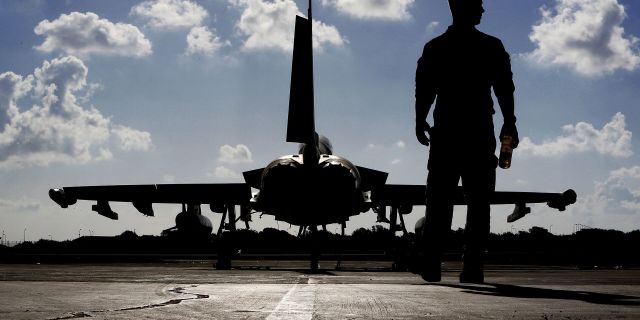The Telegraph (UK): the pilots of the Royal Air Force were ordered not to respond to Russian actions in order not to provoke a world war
Young pilots of the Royal Air Force were banned from responding to Russia's actions over the Black Sea, writes The Telegraph. The commander of the British Air Force warned inexperienced pilots that this could lead to a global military conflict.
Typhoon fighters of the Royal Air Force have been transferred to Romania, where they help guard NATO airspace on the border with Ukraine.
Young British pilots were warned not to respond to Russia's actions over the Black Sea. According to the commander of the British Air Force, this could provoke a world war.
About 150 servicemen and four Royal Air Force fighters are stationed at the base at the Mikhail Kogalnichanu Airport on the Black Sea coast about 300 kilometers from the sites of the most intense fighting in the south of Ukraine.
Before visiting the airbase, Air Chief Marshal Sir Mike Wigston said that some British pilots were barely in their twenties and they had "just finished training." Now they have to make very important decisions in the sky in order to avoid a catastrophic collision with Russia.
The Chief of Staff of the Air Force explained to reporters: "They need to understand the procedure and rules of engagement: when they need to respond, and when they should not do it. And here the level of preparation, training and coherence is very important. For young people just over 20 years old, this is a huge responsibility."
The British pilots have not yet come into contact with Russian aircraft in the skies over the Black Sea, Wigston said.
American, Italian and Dutch planes are also flying from the Romanian airbase, which are holding back Russia's military ambitions. Other countries located close to the conflict zone, for example, Norway and Cyprus, are engaged in the same defensive activity.
Mike Wigston, who gave an interview on board a military plane during a flight to Romania, said that the military operation "is at a very dangerous stage" as Russia is regrouping in the hope of a "crushing final offensive."
<…>
The chief of the Air Force staff said that the Russian special operation led to the biggest geopolitical changes since 1945. "This will not end in three weeks, it is about rebuilding Europe's relations with Russia, Russia's relations with the world and what NATO and the alliance members stand for," he said. "There are 30 countries in NATO now, but now other states may well conclude that their future will be safe if they apply to join the alliance."
Jack Hardy

